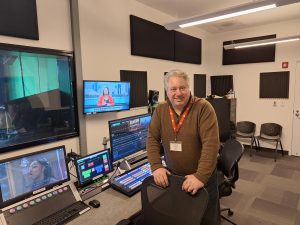Passions run deep for CAN TV crew
By Kevin Beese Staff writer — December 12, 2023
Dave Tainer, general manager of CAN TV, stands in one of the public access network’s control rooms. CAN TV is celebrating its 40th anniversary. (Photo by Kevin Beese/Chronicle Media)
Second of two parts looking at CAN TV and the future of public access television
Dave Tainer loves being part of public access television.
“We are the link to the residents of Chicago,” said the general manager of CAN TV, the city’s public access stations. “Whether you want to produce, operate a camera or be in front of the camera, you can get training here.”
He noted that public access show topics run the gamut, and that participants can get all the help they want in creating on-air content.
Tainer said it is a “very cool” feeling to help community members create their own shows.
He noted that for $100 community members or organizations can produce up to 12 shows a year at the public access hub.
Louis Roman has been at CAN TV since 2006 and loves being a camera operator at the stations.
“This place means the world to me,” Roman said. “CAN TV is my second home. I really enjoy what I do.”
Andrea Zopp worked with Darrious Hilmon at the Chicago Urban League and with the Chicago State Foundation. When Hilmon became executive director of CAN TV, he reached out to Zopp, a lawyer by training, to guest host a news show “Newsroom 2.0.”
After a few times as guest host, the show became hers.
“The show highlights individuals and important stories … We have covered a lot of important topics — violence, the Chicago police superintendent search, the migrant crisis, the war between Israel and Hamas, book-banning,” Zopp said.
She said her show did two episodes on book-banning, giving both sides of the issue. Her show has also tackled violence against women, the rise in hate crimes and challenges that women elected officials face.
“We’ve addressed a wide variety of topics,” she said.
As passionate as Zopp is about sharing information with people through her show, she is equally as excited about Chicago’s public access television, which is celebrating its 40th anniversary.
“It is a resource for the community. It supports the community,” she said. “It tells stories that are important, that make an impact. It is a place where people’s stories can be told and heard.”
Zopp said she wants to ensure that public access remains an option in Chicago.
“It is critical. It is necessary,” she said. “We shouldn’t have the airwaves controlled only by those with a large amount of dollars. There needs to be space for people who want to tell stories.”
Hilmon, executive director of CAN TV’s five stations, sees public access television fully embracing technology going forward.
“We need to build a global community. My mom (in Detroit) now can have conversations that Chicagoans are having. She can call me and tell me what she liked and what she didn’t like,” Hilmon said. “She can watch these shows, so we are all part of a global community. I’m learning how to use Instagram even more, but the core is always mass media.”
He added that partnership will be more important than ever for public access stations going forward.
“That means not just political partnerships, but partnerships with companies and institutions and organizations in a really active way because the power in our work and I think what makes us viable and valuable is the community part of it,” Hilmon said. “That really means walking, getting out into the community, having conversations, asking folks what’s important to them because we’re their representative.”
He said even global issues can be broken down and told through the Chicago lens that CAN TV can provide.
Hilmon said the training that people can get on CAN TV’s equipment is also something that has to continue.
“With all due respect, you can’t go to NBC or ABC and train on state-of-the-art equipment and then have them say, ‘Well, now that you’re a member of the organization for either $100 or a scholarship if you can’t afford it, you can check out equipment,” Hilmon said. “We have insurance and I remember saying to our youth voice digital literacy group, ‘Break it. I mean don’t break it, but you can. It’s meant to be touched. It’s not precious; and I think for far too long television has been precious. It’s been only for those in the industry.”
Hilmon uses “community access” more than “public access” because he thinks that is how the industry is going to evolve.
“It is not just talking at the community, but the active engagement of the community and knowing that we have an obligation to be more than just the place they submit videos,” Hilmon said.
CAN TV’s executive director said he wants community access to remain a vital part of the community.
“We know that somewhere in all this magic, folks are hearing something that resonates with them, that speaks to them and is being done in a way that says to them, ‘We believe in giving you lights and cameras and you have every right to it,’” Hilmon said.



